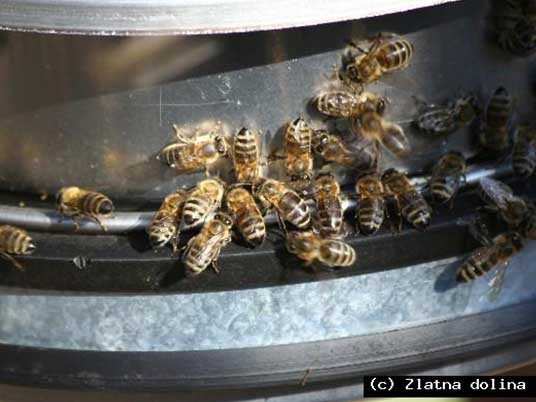Seventy-second session
Second Committee
Agenda item 19
Sustainable development
Albania, Argentina, Armenia, Australia, Austria, Bangladesh, Bhutan, Bosnia and Herzegovina, Burkina Faso, Canada, Chile, Colombia, Costa Rica, Croatia, Cuba, Finland, Georgia, Greece, Guatemala, Honduras, Hungary, India, Iraq, Ireland, Isrćl, Italy, Japan, Kazakhstan, Liechtenstein, Luxembourg, Malaysia, Malta, Monaco, Montenegro, New Zealand, Norway, Panama, Paraguay, Poland, Portugal, Republic of Moldova, Romania, Russian Federation, Serbia, Seychelles, Singapore, Slovakia, Slovenia, Spain, Sri Lanka, Thailand, the Former Yugoslav Republic of Macedonia, Turkey, Ukraine and Viet Nam: draft resolution
World Bee Day
The General Assembly,
Reaffirming its resolution 70/1 of 25 September 2015, entitled “Transforming our world: the 2030 Agenda for Sustainable Development”, in which it adopted a comprehensive, far-reaching and people-centred set of universal and transformative Sustainable Development Goals and targets, its commitment to working tirelessly for the full implementation of this Agenda by 2030, its recognition that eradicating poverty in all its forms and dimensions, including extreme poverty, is the greatest global challenge and an indispensable requirement for sustainable development, its commitment to achieving sustainable development in its three dimensions —economic, social and environmental —in a balanced and integrated manner, and to building upon the achievements of the Millennium Development Goals and seeking to address their unfinished business,
Reaffirming also its resolutions 53/199 of 15 December 1998 and 61/185 of 20 December 2006 on the proclamation of international years, and Economic and Social Council resolution 1980/67 of 25 July 1980 on international years and anniversaries, particularly paragraphs 1 to 10 of the annex thereto on the agreed criteria for the proclamation of international years, as well as paragraphs 13 and 14, in which it is stated that an international day or year should not be proclaimed before the basic arrangements for its organization and financing have been made,
Recognizing the importance of promoting sustainable development in its three dimensions in an innovative, coordinated, environmentally sound, open and shared A/C.2/72/L.32
17-18445 2/3
manner, and the urgent need to protect bees and other pollinators in a sustainable manner,
Taking into account the thematic assessment report on pollinators, pollination and food production, released in February 2016 by the Intergovernmental Science-Policy Platform on Biodiversity and Ecosystem Services,
Recalling the work of the Food and Agriculture Organization of the United Nations on pollination services for sustainable agriculture, and the leading role played by the Food and Agriculture Organization in facilitating and coordinating the International Initiative for the Conservation and Sustainable Use of Pollinators, established in 2002 under the Convention on Biological Diversity,1
1 United Nations, Treaty Series, vol. 1760, No. 30619.
Recalling also the thirteenth meeting of the Conference of the Parties to the Convention on Biological Diversity, which took place in Cancun, Mexico, from 4 to 17 December 2016, and its decision XIII/15 on the implications of the assessment of the Intergovernmental Science-Policy Platform on Biodiversity and Ecosystem Services on pollinators, pollination and food production for the work of the Convention,
Noting the urgent need to address the issue of the worldwide decline of pollinator diversity and the risks that this implies for agriculture sustainability, human livelihoods and food supplies,
Recognizing the fundamental role and contribution of bees and other pollinators with respect to sustainable food production and nutrition, which thereby promote food security for the world’s growing population and contribute to poverty alleviation, hunger eradication and human health,
Recognizing also the contribution of the ecosystem services provided by bees and other pollinators to ecosystem health by safeguarding the state of biodiversity, species and genetic diversity,
Expressing concern that bees and other pollinators are endangered by a range of factors, in particular the effects of human activities such as changes in land use, intensive agricultural practices and the use of pesticides, as well as pollution, pests, diseases and climate change, which threaten their habitat, health and development,
Acknowledging the urgent need to raise awareness at all levels and to promote and facilitate actions for the protection of bees and other pollinators in order to contribute to their health and development, bearing in mind that enhancing pollinator services is important for the achievement of the Sustainable Development Goals,
Recognizing that the observance of a World Bee Day by the international community would contribute significantly to raising awareness of the importance of bees and other pollinators at all levels and would promote global efforts and collective action for their protection,
Recalling resolution 8/2017 adopted on 7 July 2017 by the Conference of the Food and Agriculture Organization of the United Nations at its fortieth session,
1. Decides to designate 20 May as World Bee Day;
2. Invites all Member States, organizations of the United Nations system, other international and regional organizations and civil society, including non-governmental organizations, individuals and other relevant stakeholders, to observe World Bee Day in an appropriate manner and in accordance with national priorities, through education and activities aimed at raising awareness of the __________________ A/C.2/72/L.32
3/3 17-18445
importance of bees and other pollinators, the threats that they face and their contribution to sustainable development;
3. Invites the Food and Agriculture Organization of the United Nations to facilitate the observance of World Bee Day, in collaboration with other relevant organizations, mindful of the provisions contained in the annex to Economic and Social Council resolution 1980/67;
4. Stresses that the cost of all activities that may arise from the implementation of the present resolution should be met from voluntary contributions;
5. Requests the Secretary-General to bring the present resolution to the attention of all Member States, the organizations of the United Nations system and civil society organizations for appropriate observance.

